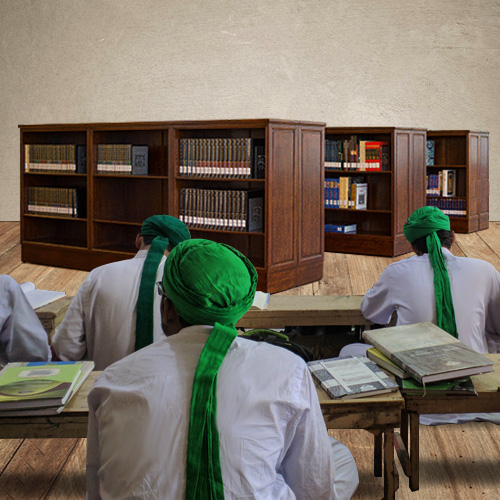Introduction to Dars-e-Nizami (Aalim course)
- By the Mercy of Allah, Jamia-tul-Madinah USA provides a five-year Dars e Nizami course. This is an Aalim course in which students study under qualified teachers and instructors, to become ordained Scholars of Islam.The level of education given at Jamia-tul-Madinah can be judged by the fact that for several years, almost every year the students of the program earn first, second and third position on the national-level Tanzee-ul-Madarris exams in Pakistan.
- Students, who enroll in the program, do not need any prior education of Islamic sciences. Jamia-tul-Madinah provides some extra courses before the first year in which the students are taught basic knowledge about Islam. These courses vary based on the level of individual’s Islamic knowledge and can range from six months to two years. After finishing the basics the students qualify to enroll in the five-year program.

- In the five-year program, students are given an opportunity to learn many Islamic sciences such as the exegeses of the Quran and the principles behind the interpretation of the Holy Book (Usool-e-Tafseer), Hadith Literature and the principle of interpretation of Hadith text (Usool-e-Hadith), Arabic Literature, Arabic Grammar, Arabic Morphology, Arabic Rhetoric, Islamic Theology, Classical Philosophy, and Classical Logic etc. The students learn these various sciences so they are well-rounded scholars and serve Allah and the religion of Islam.
- Learning the translation of the Quran from an English book is something many people do, but in the Alim course, the students are taught the meanings behind these verses. Most of the books are in Arabic allowing students to better understand the language, and use those skills in the future.
- Students are also taught worldly sciences. After completing the Aalim program, the students should also have the knowledge to work in different fields while staying within the limits of Islam. Students graduating from the program will receive a Bachelor of Art degree in Islamic Studies.
- Master of Arts in Islamic Jurisprudence
- Muslims need scholars who are specialized in giving ruling after they become ordained scholars of Islam. They can serve the Muslim community with their knowledge of scholars and can apply it to the finer points of the Islamic ruling and help solve issues in the light of Islamic Jurisprudence, while keeping up with current times and events, local customs and community norms. Jamia-tul-Madina also has a two-year specialization program in Islamic Jurisprudence.
- Conditions to Enroll for Master of Arts in Islamic Jurisprudence
- Students must complete the traditional Aalim program. It is important for students to have completed an Aalim course from another location, and pass the Dora Hadith (Final Year) Exam.
- Students must have maintained an 80% attendance rate. The student will be required to submit a copy of the transcript as well as a confirmation letter from the principle of the institute from which the student has graduated.
- The students are expected to have a 60% score rate in all of their tests during the Aalim program. Administration can request report cards for all tests before they finalize the admission.
- Students are required to maintain a good behavior and positive attitude.
- Students must complete their readings in Tafsir, Hadith, Theology, Jurisprudence, Seerah and Tasawuf.

***An interview oral exam will be taken prior to admission. This exam is designed to test the students reading, translating and interpreting skills.
Jamia-tul-Madinah not only focuses on providing Islamic knowledge to students, but also trains them on a path of spirituality. Jamia-tul-Madinah focuses on teaching students to fear Allah, love His Messenger (ﷺ),stay on the path of truth, exhibit good character through softness, patience, humbleness, politeness, and avoidbackbiting and slandering.
While training students to enhance their Islamic knowledge , Jamia-tul-Madinah also trains them to become spiritual leaders of our community with the following activities:
- Training to become the head of a Madani Qafila and preparation for Madani Qafila
- Training on how to give speeches and lectures
- Training to give Dawah in the community
- Inspiring others through individual efforts
- Acting according to the Madani In’amat
- Participating in weekly speech competition every Friday
- Teaching the 12 Madani works of Dawat-e-Islami and conducting those works in the nearest Masjid

